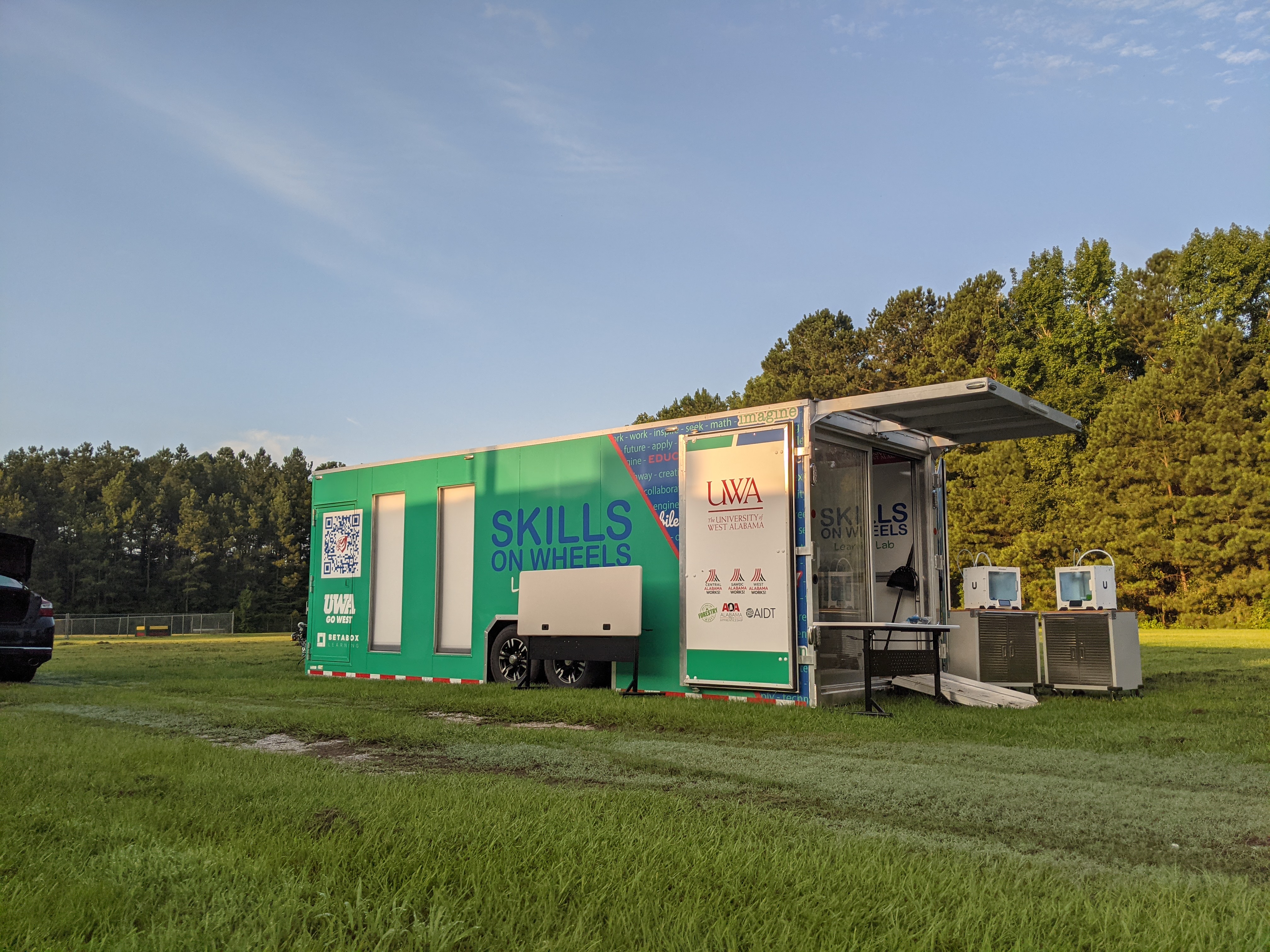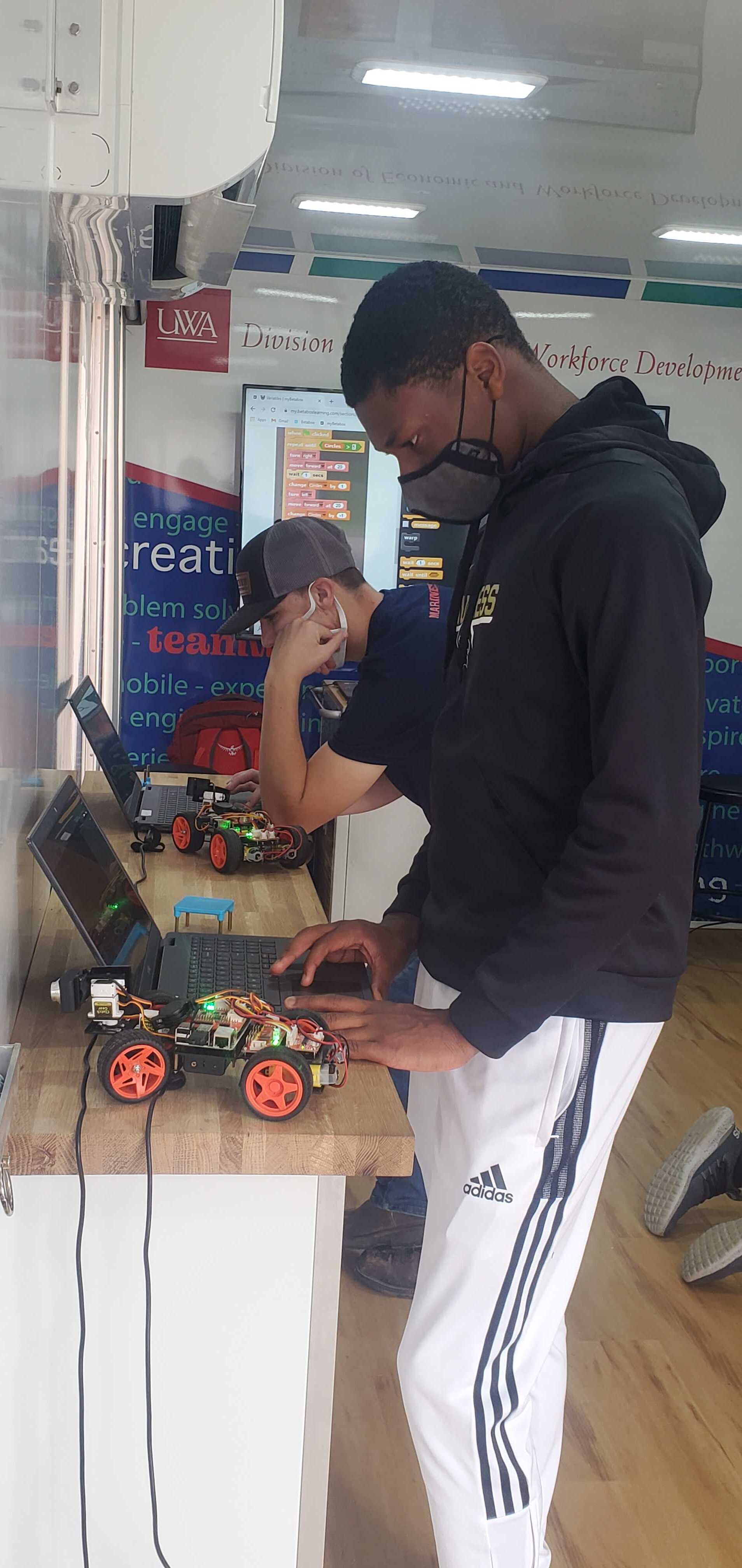
Skills on Wheels mobile units deploy across Black Belt region to fill the gaps in workforce development and secondary education
Skills on Wheels mobile units deploy across Black Belt region to fill the gaps in workforce development and secondary education
For a year amid the lingering effects of the COVID-19 pandemic, the University of West Alabama has dispatched its fleet of Skills on Wheels mobile lab units to sites throughout 10 counties of Alabama’s expansive Black Belt region.
Once there, their impact has been immediate.
“When we roll into town, they get a lot of attention,” said Dr. Tina Jones, vice president of the university’s Division of Economic and Workforce Development and a professor of English at UWA.
The lab units are one component of an initiative — LINCS, or Leveraging Interconnected Networks for Change and Sustainability—charged with improving and expanding the region’s workforce through skills-based training and education.

Resembling truncated versions of college football fans’ RVs, the lab units were born through a $2.5 million WORC grant from the U.S. Department of Labor and the Delta Regional Authority. Each features generator power, heating and air-conditioning, overhead viewing screens, virtual-reality headsets, wireless internet and retractable awnings for outdoor instruction. The interiors are equipped with wall-to-wall white boards, computers and educational components geared to the unit’s specific use. And hauling them doesn’t require a semi-trailer truck. Though the learning spaces are 23 feet long, nine feet tall and eight-and-a-half feet wide, large-engine pickups do the trick.
UWA is a public, four-year university in one of Alabama’s more rural regions, which is why its outreach efforts in workforce development and secondary education are so critical, Jones said.
“The key thing there is our mission (at UWA) is to be a resource in which we fill gaps in the region,” Jones said. “That might be in staffing, that might be in equipment, it just depends on what the needs are for those stakeholders. That is what we are constantly looking at—what are the gaps?”
The university’s lab units are instrumental in that process, she said. Diversity and flexibility matter. With three units at its disposal, UWA can assist K-12 schools enhance the catalogue of classes available to students, assist soon-to-be and recent graduates with earning ready-to-work certificates, and provide on-site chances for experienced employees in specific industries to gain advanced training.
UWA’s assigned 10-county Black Belt region — Sumter, Choctaw, Clarke, Greene, Hale, Marengo, Perry, Pickens, Washington and Wilcox counties — allows it to partner with others involved in education and workforce development. UWA’s region, Jones said, overlaps with three regional workforce councils and four community-college systems.
Teamwork allows UWA and its colleagues to tailor the lab units’ uses for the schools and industries that request them.
When the units visit K-12 schools, two board-certified teachers—one from Meridian, Miss., and one from Northport—are available to help with instruction. For example, the secondary education unit, which went online in May, can offer students exposure to modern fields involved with self-driving cars, remote-control drones, robotic cars and video game design.

The point, Jones said, is to expose middle- and high-school students to science and math-related professions that may spark their interests—or, perhaps, ignite new ones.
“We try to tie it to what we call hot careers, so they can see a tie-in to what they are learning in the classroom to what they might one day want to do,” she said.
“The other thing is it is getting them exposure instead of thinking of jobs in such a straight way — ‘I want to be an engineer, I want to be a lawyer.’ It’s helping them understand the skills they will need to be employed, and also how their lessons they are doing in class, the math and science, ties into those skills.”
When lab units visit workplaces, their computers can feature industry software that allows employees to train with job-specific simulations. With its industrial and community college partners, UWA’s lab units have helped employers offer leadership and supervisory training and receive ready-to-work certificates.
Mobility, Jones said, ranks high among the Skills on Wheels program’s important attributes. By bringing the classroom to the trainees, UWA is reducing what she says is “one of the No. 1 barriers for people to ‘upskill’” in the region.
“The stakeholders that we serve are having to drive these great distances to get to training,” she said. “If we put these units out, then we have the ability to meet people where they are rather than having to demand that they drive to us. We have the ability for them to stay on site and train rather than go somewhere else.”
One recent lab visit, to a site in the Choctaw County city of Butler, illustrated the partnership between UWA and other campuses, Jones said. In Butler, UWA provided the lab unit, laptops and virtual-reality headsets, and Coastal Alabama Community College provided the instructor and curriculum so people could earn ready-to-work certificates near their homes or current employers.
That teamwork between UWA and the community college eliminated many Alabamians’ commute to Thomasville in Clarke County—a 45-minute drive—for similar training, she said.
In part because of the pandemic’s effect on west Alabama’s schools and industries, Jones believes the Skills on Wheels program remains in its infancy because “people are just now beginning to understand it because it took a while to build it out.”
But the potential, she also believes, is unmistakable.
“As one (school) principal told us, ‘The kids would rather come out here than go to the playground,’” Jones said.